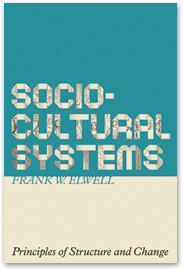
Sociocultural Systems: Principles of Structure and Change Macrosociology: Four Modern Theorists A Commentary on Malthus" 1798 Essay as Social Theory Great Classical Social Theorists In the Classical Tradition: Modern Social Theorists Dr. Elwell's Professional Page
|
Herbert Spencer's Evolutionary Sociology Max Weber [1864-1920] | |
|
Max
Weber An excerpt from
Sociocultural
Systems: Principles of Structure and Change
By Frank W. Elwell
Weber’s analysis of sociocultural change is based on cumulative changes in
sociocultural systems, with changes in one component of society leading to
changes in others, and eventually changes in the overall system itself. That
Weber is a social evolutionist—that is, asserting cumulative systemic
change—is attested to throughout his writings. As mentioned previously, he
uses the term “evolution” extensively in his writings, even using it in
several chapter and section headings. While he is far too much of a systems
theorist to assert the near “single-causality” of Marx and his followers, he
clearly gives material and structural factors great weight in his analysis
of sociocultural change.[1]
Some have asserted that Weber went so far as to claim that the
rationalization process itself was an inevitable evolutionary development.
For example Gerth and Mills (1946/1958) characterize the rationalization
process as Weber’s “philosophy of history” with the rise and fall of empires
and nations, rulers, and classes progressively serving the drift toward a
bureaucratized and rationalized world (51). And there are passages from
Weber that support this, perhaps the most telling are remarks Weber made to
the Association for Social Policy (Verein
fur Sozialpolitik) in Vienna in 1909 in which he warned of the dangers
of bureaucratization. Perhaps
because it was a political speech and not the careful scholarship he is
known for, Weber was much more expressive of his personal reactions to
bureaucracy, his predictions as to the evolutionary trajectory of the West,
the growing bureaucratic juggernaut, and of his views of socialism and
capitalism:
It is horrible to think that the world could one day be filled with nothing
but those little cogs, little men clinging to little jobs and striving
toward bigger ones--a state of affairs which is to be seen once more, as in
the Egyptian records, playing an ever increasing part in the spirit of our
present administrative systems, and especially of its offspring, the
students. This passion for bureaucracy ...is enough to drive one to despair.
It is as if in politics. . . we were to deliberately to become men who need
"order" and nothing but order, become nervous and cowardly if for one moment
this order wavers, and helpless if they are torn away from their total
incorporation in it. That the world should know no men but these: it is in
such an evolution that we are already caught up, and the great question is,
therefore, not how we can promote and hasten it, but what can we oppose to
this machinery in order to keep a portion of mankind free from this
parceling-out of the soul, from this supreme mastery of the bureaucratic way
of life…
It is apparent that today we are proceeding towards an evolution which
resembles (the ancient kingdom of Egypt) in every detail, except that it is
built on other foundations, on technically more perfect, more rationalized,
and therefore much more mechanized foundations. The problem which
besets us now is not: how can this evolution be changed?--for that is
impossible, but: what will come of it? (Mayer
1944, Appendix A 127).[2]
More famously (and traditionally more available) Weber (1904/1930)
strikes similar themes in the closing paragraphs
of The Protestant Ethic. :
This order is now bound to the technical and economic conditions of machine
production which today determine the lives of all individuals who are born
into this mechanism, not only those directly concerned with economic
acquisition, with irresistible force. Perhaps it will so determine them
until the last ton of fossilized coal is burnt. In Baxter’s view the care
for external goods should only lie on the shoulders of the “saint like a
light cloak, which can be thrown aside at any moment.’ But fate decreed that
the cloak should become an iron cage.
Since asceticism undertook to remodel the world and to work out its ideals
in the world, material goods have gained an increasing and finally an
inexorable power over the lives of men as at no previous period in history.
To-day the spirit of religious asceticism—whether finally, who knows?—has
escaped from the cage. But victorious capitalism, since it rests on
mechanical foundations, needs its support no longer….In the field of its
highest development, in the United States, the pursuit of wealth, stripped
of its religious and ethical meaning, tends to become associated with purely
mundane passions, which often actually give it the character of sport.
No one knows who will live in this cage in the future, or whether at the end
of this tremendous development entirely new prophets will arise, or there
will be a great rebirth of old ideas and ideals or, if neither, mechanized
petrification embellished with a sort of convulsive self-importance. For of
the last stage of this cultural development, it might well be truly said:
'Specialists without spirit, sensualists without heart; this nullity
imagines that it has obtained a level of civilization never before achieved
(181-182).
There are several things I want to call to your attention about the passages
from the Protestant Ethic quoted
above. First, note how in the first paragraph Weber ties the social order
“to the technical and economic conditions of machine production” which now
determine the lives of all. Capitalism, Weber believes, is one of the
primary carriers of bureaucracy and rationalization, and he sees its triumph
as having dire consequences for the entire society, specifically, an iron
cage in which social life is dominated by bureaucratic organization and
centered on the acquisition of material goods. Also note that the only limit
he sees on the continuing mechanization and bureaucratization of society
appears to be the availability of fossil fuels upon which it is based.
In the second paragraph of the quote, Weber makes clear that while the
Protestant Ethic helped begin capitalism, capital now exists independently
of that ethic. As we have seen, Weber came to believe that material and
structural factors played a much larger role in the origin of capitalism,
yet true to his systemic view of society, he continued to see a role for
ideas in his sociology. It is also interesting that at this early date he
likens the pursuit of profit in America to sport.
In the final paragraph of the extract above, Weber again speculates on where
evolution is taking us. Will it be a continuation of current trends—an iron
cage in which tradition, values, and emotions play an ever diminishing role,
where goal oriented rational behavior increasingly rule our lives in the
pursuit of wealth and material possessions, though such “nullities” might
well imagine that they are living at the pinnacle of civilization. Or, will
this development be finally stopped by the rise of new prophets and
charismatics, calling us to higher purpose?
Others argue that these speculations are not part of Weber’s theory but
rather his all too human reaction to his analysis. And this too is supported
in the final paragraphs of The
Protestant Ethic, where he writes that the above lament is one of
“judgments of value and faith, with which this purely historical discussion
need not be burdened” (182).
But he did burden his discussion with this, and though his speculations go
beyond his historical analysis they are consistent with the evolutionary
trends identified in that analysis. Regardless, many of his followers have
incorporated this pessimistic view of evolution into their analysis, for
once encountered who could escape?[3]
[1]
Again, I would assert (along with many
others) that Marx himself made no such claim
that the means of production determined all.
[2]
As the speech is very revealing but not
widely available I have included it verbatim
off of the following website:
http://www.faculty.rsu.edu/users/f/felwell/www/Theorists/Weber/Whome.htm
[3]
And this last comment by me, that “who could
escape?” is a reflection of my value and
faith—value I place on Max Weber’s
sociology, faith in my fellow
students—rather than my sociology. For a more extensive discussion of Weber's theories refer to Macro Social Theory by Frank W. Elwell. Also see Sociocultural Systems: Principles of Structure and Change to learn how his insights contribute to a more complete understanding of modern societies.
References:
Elwell, F. 2009.
Macrosociology: The Study of Sociocultural
Systems. Lewiston: Mellen Press.
Elwell, F. W. 2013. Sociocultural Systems:
Principles of Structure and Change. Alberta:
Athabasca University Press.
Weber, M. 1903-1917/1949. The Methodology of
the Social Sciences. (E. Shils, H. Finch,
Eds., E. Shills, & H. Finch, Trans.) New
York: Free Press.
Weber, M. 1904/1930. The Protestant Ethic
and the Spirit of Capitalism. (T.
Parsons, Trans.) New York: The Citadel
Press.
Weber, M. 1921/1968. Economy and Society.
(G. Roth, C. Wittich, Eds., G. Roth, & C.
Wittich, Trans.) New York: Bedminster Press.
Weber, M. 1927/2003.
General Economic History. (F. Knight,
Trans.) Mineola, New York: Dover
Publications, Inc.
Weber, M. 1946/1958.
Essays in Sociology. (H. Gerth and C.
Mills, Eds. And Trans.) In M. Weber, H.
Gerth, & C. Mills, From Max Weber.
New York: Oxford University Press.
Referencing
this Site:
Weber’s Evolutionism is copyrighted by Frank
W. Elwell. Should you wish to quote from
this material the format should be as
follows:
Elwell, Frank, 1996, "Weber’s Evolutionism"
Retrieved June 1, 1999 [use actual date],
http://www.faculty.rsu.edu/~felwell/Theorists/Weber/Whome4.htm
Over
|
